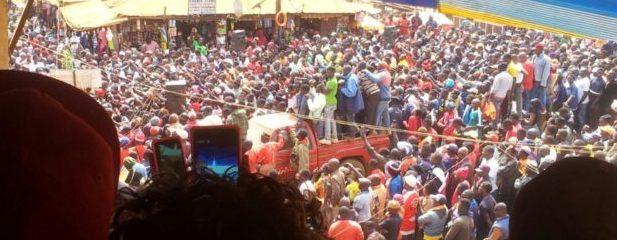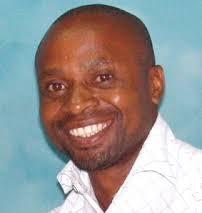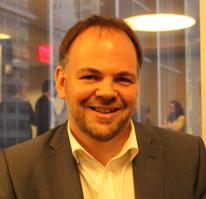Cameroon: Anglophone activists call for month of “ghost towns” moments before arrests and Internet shutdown

The latest developments are the culmination of escalating tensions over several months, which have seen widespread strikes, protests, arrests and deaths.

Activists in Cameroon’s English-speaking regions complain of marginalisation. Credit: Mbom Sixtus.
On 17 January, Cameroonian activists on social media struck a tone of both despondency and defiance as news broke of the arrests of two prominent civil society leaders. Felix Agbor Nkongho and Fontem Neba had been at the forefront of the campaign for greater autonomy for the English-speaking regions of Cameroon, and their sudden arrests came as a shock to many.
“We are finished. So this is how it was all going to end,” lamented one campaigner. Another responded more hopefully, commenting that “tears rolled down my cheeks when I got the news… [but] our leaders will find a way”.
Soon this exchange was cut short, however, as the Internet went down across Cameroon, and in particular the English-speaking areas.
This clampdown on communication has spread greater uncertainty over what will come next in these restive regions, which have seen escalating strikes, protests, arrests and fatal violence over the past few months.
Many in Cameroon’s two English-speaking regions – the Northwest and Southwest – claim that they have been discriminated against since reunification in 1961. They say that the central government privileges the majority French-speaking population and eight other regions. Amongst other things, campaigners complain of being treated as second-class citizens, of marginalisation in the education and judicial system, of lack of representation in government, of a perceived lack of returns from oil extracted from the region, and of the erosion of Anglophone identity.
These grievances have been simmering since the 1990s, when the Southern Cameron National Council (SCNC) was established with the aim of “restoring” the independence of West Cameroon. But this discontentment has resurfaced and intensified recently, though the emphasis today has been on demanding a referendum on federalism rather than secession.
Escalation of grievances
In May 2015, the Common Law Lawyers association sent a letter to President Paul Biya, objecting to the appointment of French-educated judges – who they say do not understand English common law which is used in West Cameroon – to their courts. They requested the withdrawal of these magistrates and demanded the restoration of federalism, which had ended with the adoption of a new constitution in 1972.
In October 2016, in the face of the government’s non-response, the lawyers finally decided to make their voices heard by striking and organising marches to the courts. In November, police dispersed demonstrations with tear gas, leading to multiple injuries.
On 21 November, this Anglophone campaign intensified as thousands of teachers joined the lawyer’s sit-down strike, complaining against what they see as the imposition of French in schools. On that same day, activist Mancho Bibixy embarked on a solo protest centred on the poor state of roads in Bamenda, the largest city in West Cameroon. He marched along Commercial Avenue, carrying a coffin and saying he was ready to die for his cause. Along his journey, he picked up support from commercial bike riders and other citizens. Eventually, security forces intervened, leading to bloody clashes and the death of one protester.
In the following days and weeks, tensions mounted as the strikes continued. The police engaged in mass arrests of protesters and there were a number of deaths at the hands of police. On 29 November, when students at the University of Buea embarked on their own related protest, security forces beat students with batons, fired teargas, and allegedly sexually assaulted some protesters.
Another flashpoint in the escalating crisis came shortly after on 8 December, as Paul Atanga Nji, a minister in Biya’s government, who had previously angered activists by dismissing their grievances, organised a ruling party meeting in Bamenda. Angry protesters stormed the premises and attacked the gathering, requiring soldiers to rescue officials. Four protesters were shot dead, many others were injured, and dozens were arrested.
In response to mass arrests and state violence in the face of the mostly peaceful protests over the past few months, international bodies have increasingly raised concerns. The UN High Commissioner for Human Rights called on the government to investigate the police’s use of “excessive force”. Amnesty International demanded authorities refrain from “unlawful force” and warned that “excessive force threatens to further enflame an already tense situation”.
Meanwhile, the African Commission on Human and Peoples’ Rights issued a highly critical press release, stating: “The Special Rapporteur condemns very strongly the alleged use of disproportionate force against civilians, the violent and deathly suppression of peaceful demonstrators”.
Ghost towns
In mid-January, there were momentarily signs that the long-running impasse may be coming to an end. Members of the Cameroon Anglophone Civil Society Consortium, a grouping of organisations behind the protests, agreed to meet with the government despite earlier reservations.
In a press briefing from the Consortium on 14 January, representatives explained that: “In spite of the non release of those children kidnapped and taken to Yaounde where they have been tortured mercilessly, the Unions still accepted to talk to govenunent [sic] in the hope that reason might prevail.” It claimed that, “The talks were frank, heated and occasionally cordial.”
Yet it continued that after security forces “went on rampage…shooting four unarmed young men and severely wounding them” while the talks were ongoing, the Consortium had no choice but to pull out. Instead, the campaigners declared a “ghost town” on 16 and 17 January and called on supporters to stay at home in peaceful protest.
On both these days, many Cameroonians heeded the call with businesses staying closed and many roads lying largely abandoned. However, some protesters took their anger to the streets, with one group reportedly blocking trucks from transporting petroleum and timber to Francophone Cameroon. Further arrests and violence was witnessed.
This set the stage for 17 January, when the government appears to have lost patience. In the afternoon, it announced the banning of the Consortium along with the secessionist SCNC. Government spokesperson Issa Tchiroma suggested the leaders of the Consortium were in fact working for the SCNC and were hiding their real agendas behind other demands.
Felix Agbor Nkongho and Fontem Neba, respectively the president and secretary-general of the Consortium, were arrested and the government terminated its invitation of dialogue. Soon after, access to the Internet was severely limited.
In a hurried release following its banning yesterday, the Consortium warned supporters: “it is uncertain how things turn out in the hours ahead; things may go so fast and you may be seeing this release when most of us could be under detention”.
The campaigners quickly designated two foreign-based activists – Mark Bara in Belgium and Tapang Ivo Tanku in the US – to take over the leadership of the movement, reassuring supporters that “they have been sufficiently briefed on our non-violent approach to this struggle”.
In a final bid, the Consortium also called for more peaceful ghost towns “from Monday to Wednesday every week…for a period of one month” in order to “tell the world our plight and suffering”.
On 18 January, two former leaders of the Cameroon Bar Association, Barristers Akere Muna and Bernard Muna, led a group of 30 lawyers to Yaoundé to secure the release of the Consortium leaders who had been transferred from the town of Buea overnight. Some of the lawyers took photos with Felix Agbor and shared them on Facebook, reassuring citizens that the strike leaders are in good condition. Tassang Wilfred, who had been speculated to be the next likely leader of the Consortium and targeted for arrest, was reported to have gained asylum in an Embassy in Yaoundé.
The recent arrests of prominent activists, the banning of the Consortium, and the shutdown of the Internet mark the culmination of months of escalating tensions between the government and activists. The government is no doubt hoping this crisis point will force the campaigners to yield, but with so much uncertain and frustrations intensifying, it remains to be seen how the movement will now respond.
Mbom Sixtus is a freelance journalist based in Yaoundé.







From the Excerpt of “Triple Agent Double Cross”
The African Pearl
If you board a plane or ship plying any of the international routes and ask to be taken to the heart of Africa, do not be surprised to find yourself disembarking in Cameroon. It is a beautiful country per se, situated opposite the middle portion of Brazil, on the eastern side of the Atlantic Ocean. Bordered by six countries of which Nigeria is the most prominent neighbor, Cameroon appears on maps like a heavily pregnant mother carrying a baby on her back. .
This peculiar geopolitical entity was created by accident and apportioned to Germany during the 1884 Berlin conference that carved up Africa. Berlin treated German Kamerun as its treasured colony for thirty-two years until Great Britain and France captured the land during the First World War, partitioned it into British Cameroons and French Cameroun, and then went on to lord it over the people for four decades. However, they too were challenged by Cameroonian nationalists who campaigned for the divided territory’s reunification and self-rule. Today, English and French are the country’s official languages, mirroring the dominance of the two Indo-European languages in Africa.
They say the gods have a design even in the most outrageous acts of mortals. If that is the case, then it also applies to Cameroon. The country has defied so many odds in its history that the people now pride themselves with the saying that “Impossible isn’t a Cameroonian word.”
Renowned voices tend to call Cameroon “Africa in miniature”, not only because of its fanciful shape and turbulent history, but also because of the physical and human aspects of its geography. It is the point in Africa where the East meets the West and where the North meets the South. It is a country that features plains and mountains, plateaus and valleys, rivers and seas, lakes and waterfalls and other landmarks that mirror the rest of Africa. The south is dominated by equatorial and tropical rainforests, the north is covered by Sahelian vegetation, and the middle portion of the country is graced with high savannah of mixed grassland and forest. In fact, all the different flora and fauna in Africa can be found in this carelessly drawn triangle called Cameroon.
The curious eye is apt to notice varying statures, facial types and shades of complexion as it travels throughout Cameroon—a legacy of the territory’s history as the crossroads of African migrations. Anthropological linguists hold that all of Africa’s four major language groups converge in Cameroon.
The southern portion of the country is the base from where Bantu speakers spread to southern and eastern Africa. The furthest spread of Afro-Asiatic peoples is in the north of this territory, featuring groups like the Semitic-speaking Arabs, Berber-speaking Tuaregs, Chadic-speaking Hausas and Batas, and Fula or Fulfulde-speaking Fulanis or Peuls. Nilo-Saharan speakers dominate the north of the country in their furthest spread to the west of the continent. Also present in Cameroon are small ethnicities of the fourth major subgroup (Niger-Congo A) that occupy the southwestern border regions with Nigeria. Settled in the northwestern portion of the country that looks like the pregnant part of mother Cameroon is the fifth and unique indigenous group that you will find only in Cameroon. Called semi-Bantu, Graffi or southern Bantoid, this group has characteristics of all the four major language groups or sub-races in Africa. Legends and lore hold that semi-Bantus are originally of Afro-Asiatic and Nilo-Saharan descent and that they assimilated all the peoples they encountered in the course of their migration. The Bamileké people are the dominant ethnicity in this group.
It is true that Cameroon’s human and physical wealth has been the source of its turbulent history, its pride and the ingredients that give its people a unique flavor. The flavor has produced colorful Cameroonian characters that the curious eye and mind is likely to enjoy by hating or loving them, pitying or angrily denouncing them. These characters provide insights into the human nature and the African continent that is haunted by leaders with the evil disposition.
While other African peoples have picked up arms and warred among themselves to have their country split up, Cameroon is the only geo-political entity in the continent whose inhabitants went to war to reunite its people separated by the legacy of Anglo-French partition of the former German colony of Kamerun. It is the only country where those who fought for its reunification and independence are yet to assume political power, as they continue to languish from the defeat suffered in the hands of the French overlords and the puppets they installed in power. It is the land where you will find Africa’s biggest political deception and sleaziest mafia. It is the country in Africa with the lowest number of heads of state in its history, yet it is a country that is unlikely to engage in internecine war to get rid of the suffocating system.
In the middle of the twentieth century, a child was born in Cameroon who by the age of ten, proved he could become anything he wanted to be. This child prodigy happened to be the son of a soldier of the Free French Forces that fought across the African desert and liberated France from German occupation during the Second World War. The boy looked up to his revolutionary father as the greatest source of inspiration in his life. But how he ended up serving those who wrecked his world is the riddle the rest of the story is going to unravel…
(Culled from Triple Agent, Double Cross)
Part II: Afterthought on 07/04/2015: Cameroon as a Hijacked Nation
In power since 1982 is Africa’s absentee dictator Paul Biya, who was made the successor of his predecessor Ahmadou Ahidjo by an order from former French President Francoise Mitterand; Ahidjo, who himself was brought to power by the French to usurp the aspirations of Cameroonians in their liberation struggle led by the UPC that the French banned in 1955, a party with more than 80% of the land’s intellectuals and even more national support. France had made sure Ahidjo’s power was secured by decimating its support base in a 12-year war against the party and by killing all the UPC leaders (Un Nyobe 1958, Felix Moumie in Geneva 1960, Ossende Ofana 1966, Ernest Ouandie 1971 etc.), leaving Cameroon a nation haunted by an “Unfinished Liberation Struggle”. Today, Cameroonians are out not only to get rid of the Dictator Biya’s autocracy, but also to get rid of the French-imposed system that its custodians want to continue with someone else after Paul Biya departs.
Part III: Cameroon under an oppressive system and haunted by Terrorism
Compounded by the retrogressive system and the lunacy of the Biya regime is the specter of Boko Haram that started haunting northern Cameroon a few years ago, a distorted form of Islam espoused by a group that sees glory in the murder of the innocent (women, children and other civilians), a spillover from Nigeria’s religious tension and an amalgamation of geopolitics as foreign interests extend the exploitation of resources in the Lake Chad basin. Only a Cameroon rid of the retrogressive French-imposed system and headed by those who put the interest of the land above their personal interests or the interests of foreign entities who have no genuine concern for the land, can the citizens of Cameroon be certain that the country and government would be able to handle the insecurity posed by anti-people and dehumanized groups like Boko-Haram. In fact, Boko-Haram in North Cameroon and the system/Biya regime are in symbiosis as they make each other relevant in a space where both are loathed by the vast majority of Cameroonians.
This is really unbelievable that other countries are spending billions of dollars to keep or integrate their different cultures and identity, protecting and building their national infrastruture, competing for civilization and modernization, the cameroon government is instead fighting against all these. When will the government stop thinking about their stomach and instead start thinking about the people and the country. what is democracy if it is not being practice. when will the world put look or listen to what is happening to the people of cameroon. this is not a problem for the anglophone but a problem for the whole cameroon. the french part is totally blinded, so it is impossible to even see what the other side is witnessing. there is much to this and time is coming for us to do something to protect the future of our children and the whole cameroon.
The government of Cameroon should continue negotiations instead of arresting strike leaders. These problems we postpone for our children to solve. It is better we tackle them now and leave a better future for our children for all Cameroon. We have done much to leave them with a lot of foreign debt. Let us no leave them again with issues of identify and marginalization.
The arrest, detention, torture and execution of Southern Cameroonians by the government of La Republique du Cameroun constitute an effort towards the wrong direction. Citizens of Southern Cameroons are not their slaves. Southern Cameroonians are a people, with their territory and population. What is lacking is only the government, which I suggest should be put in place as soon as possible and independence declared. What La Republique and its Biya regime are doing are just the last kicks of a dying horse.
No negotiations, the only solution is independence for Ambazonia.
We don’t want anymore negotiations please our only and best solution is secession, we want our independence.